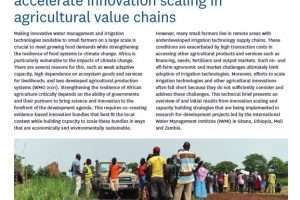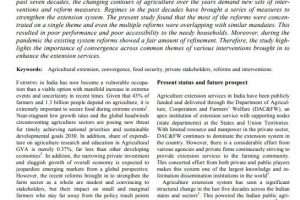The shock of Coronavirus Disease 2019 (COVID-19) has disrupted food systems worldwide. Such disruption, affecting multiple systems interfaces in smallholder agriculture, is unprecedented and needs to be understood from multi-stakeholder perspectives. The multiple loops of causality in the pathways of impact renders the system outcomes unpredictable. Understanding the nature of such unpredictable pathways is critical to identify present and future systems intervention strategies. Our study aims to explore the multiple pathways of present and future impact created by the pandemic and “Amphan” cyclonic storm on smallholder agricultural systems. Also, we anticipate the behaviour of the systems elements under different realistic scenarios of intervention. We explored the severity and multi-faceted impacts of the pandemic on vulnerable smallholder agricultural production systems through in-depth interactions with key players at the micro-level. It provided contextual information, and revealed critical insights to understand the cascading effect of the pandemic and the cyclone on farm households. We employed thematic analysis of in-depth interviews with multiple stakeholders in Sundarbans areas in eastern India, to identify the present and future systems outcomes caused by the pandemic, and later compounded by “Amphan”. The immediate adaptation strategies of the farmers were engaging family labors, exchanging labors with neighbouring farmers, borrowing money from relatives, accessing free food rations, replacing dead livestock, early harvesting, and reclamation of water bodies. The thematic analysis identified several systems elements, such as harvesting, marketing, labor accessibility, among others, through which the impacts of the pandemic were expressed. Drawing on these outputs, we employed Mental Modeler, a Fuzzy-Logic Cognitive Mapping tool, to develop multi-stakeholder mental models for the smallholder agricultural systems of the region. Analysis of the mental models indicated the centrality of “Kharif” (monsoon) rice production, current farm income, and investment for the next crop cycle to determine the pathways and degree of the dual impact on farm households. Current household expenditure, livestock, and soil fertility were other central elements in the shared mental model. Scenario analysis with multiple stakeholders suggested enhanced market access and current household income, sustained investment in farming, rapid improvement in affected soil, irrigation water and livestock as the most effective strategies to enhance the resilience of farm families during and after the pandemic. This study may help in formulating short and long-term intervention strategies in the post-pandemic communities, and the methodological approach can be used elsewhere to understand perturbed socio ecological systems to formulate anticipatory intervention strategies based on collective wisdom of stakeholders.




Add Comment